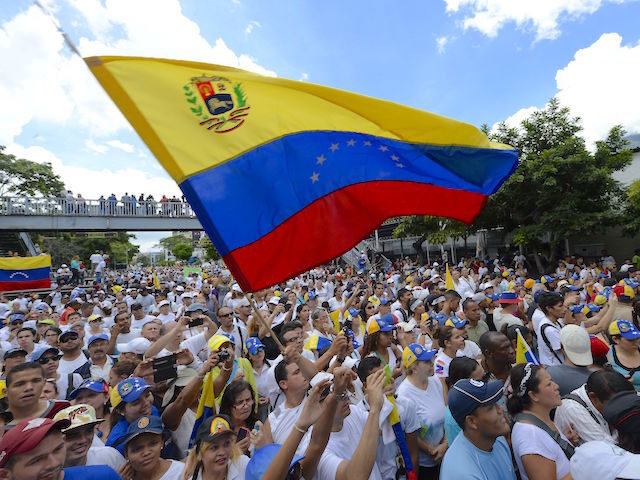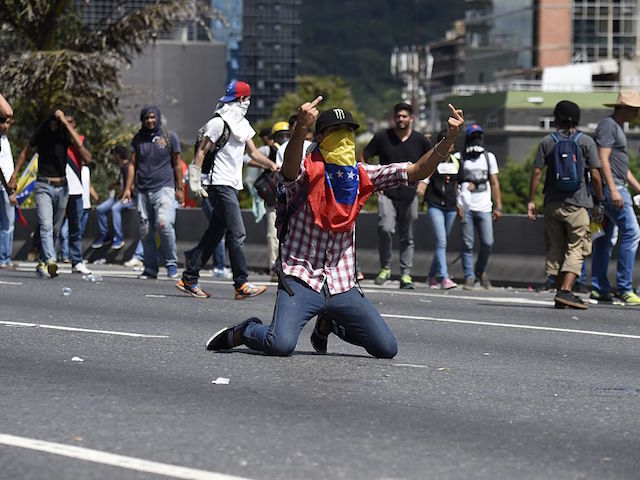In anticipation of a major rally against the socialist government Thursday, Venezuelan police rounded up and deported journalists affiliated with the Miami Herald, Le Monde, Al Jazeera, and the Committee to Protect Journalists (CPJ).
“As soon as I stepped off the plane at the Caracas airport, immigration officials confiscated my passport, then ordered me to take the next flight back to Bogotá,” the CPJ’s John Otis, who is based in Colombia, writes in NPR. He notes that, as he writes the article awaiting his flight, “alongside me… are Marie-Eve Detoeuf of the French daily Le Monde, and Cesar Moreno, a reporter for Colombia’s Radio Caracol. A few days ago an Al-Jazeera TV crew was turned back at the airport.”
Miami Herald Andean bureau chief Jim Wyss was also forced to leave Venezuela after arriving on Tuesday to cover protests this week. He was detained for 48 hours before being forced onto a plane home. “Venezuelan authorities said the detention stemmed from not having the proper media credentials,” Fox News reports.
The crackdown on foreign journalists follows a string of mysterious attacks on local media. The CPJ reported Wednesday that multiple “incidents of vandalism” had been reported against newspapers that report the reality on the ground in Venezuela, including protests, shortages, and police violence. Among those attacked was the opposition newspaper El Nacional, targeted by “excrement and homemade explosives,” and El Diario de los Andes, which was shot at last week.
The Venezuelan opposition is currently staging the “Caracas Takeover,” a protest demanding the government bureaucracy process a petition to force a new presidential election in a timely manner. The Democratic Unity Roundtable (MUD), a coalition of opposition parties, has submitted the signatures required for a referendum to oust unpopular president Nicolás Maduro. The socialist government has stalled on verifying the signatures as a method of keeping the election from happening.
As the Argentine outlet Infobae explains, an election will only happen if the referendum is concluded before January 10. If the referendum occurs after that date and Maduro is removed, he will be replaced by the nation’s Vice President, which would prevent opposition parties from standing for election. The latest polls indicate that Maduro would lose a referendum decisively if it occurred today, largely due to his gross mismanagement of the nation’s economy, leading to extreme shortages of food and medicine, and to the government’s oppression of opposition groups protesting these shortages.
Chavista authorities warned the opposition to cancel the Caracas takeover or face state violence. The Venezuelan legislature’s minority leader, Diosdado Cabello, warned the opposition in a speech earlier this week: “do not provoke us: we will not only block Caracas so that no one may get in, but also so that no one can get out.”
The government has done all it can to fulfill the first half of that promise. Public transportation was shut down Wednesday to prevent outsiders from joining the protest on Thursday. Police blocked roads and tunnels. But masses of people chose to walk through the barricades where they could not drive, and have pushed through to the capital, as images shared on social media show.
Así fue como manifestantes lograron que se abriera paso por túnel La Cabrera #TomadeCaracas https://t.co/n0lSaKNqvd pic.twitter.com/hV35IsKwJN
— Diario Las Américas (@DLasAmericas) September 1, 2016
Trancado completamente Peaje de Guacara, ciudadanos deciden caminar para avanzar hacia la gran toma de #Caracas #1S pic.twitter.com/hmavZhtFiC
— Daniel Antequera (@danielantequera) September 1, 2016
Univisión reporter Yusnaby Pérez is estimating the crowd in Caracas currently at one million and counting.
#1SeptReclamoDeLibertad pic.twitter.com/TaMkHk6I3Z
— Reinaldo dos Santos (@ReinaldoProfeta) September 1, 2016
The opposition has rallied not only the middle classes most devastated by socialist policies, but many of Caracas’ poor. Among those coming in from outside the city are indigenous tribes protesting the incursion of the Maduro government in their lives.
RT @ElPitazoTV: #Caracas1S Manifestantes indígenas desde Bello Monte #1S https://t.co/KFqRWqWxiW pic.twitter.com/yYCe9WJX9W
— Eugenio G. Martínez (@puzkas) September 1, 2016
“Toma de Caracas” colma las avenidas Libertador, Río de Janeiro y Francisco de Miranda https://t.co/cOttdgSOru pic.twitter.com/VsNIdOqw83
— NTN24 Venezuela (@NTN24ve) September 1, 2016
#Video Mira a la abuela de 99 años que dijó presente en la “Toma de #Caracas” https://t.co/7xpSs3xINb pic.twitter.com/KMVdZgUVhv
— CaraotaDigital (@CaraotaDigital) September 1, 2016
t.@leonardobecr #1S Marcha del paraíso ya toma avenida Victoria al oeste de Caracas 10:20am pic.twitter.com/PDWez005WS SantiagoA1411
— ADRIANA AZZI (@ADRIANAAZZIAS) September 1, 2016
Una locura la toma de Caracas en manos del pueblo venezolano! ¡Toda América Latina unida! #1SeptReclamoDeLibertadpic.twitter.com/17XVLeei4z
— LUCHO BUGALLO (@LuchoBugallo) September 1, 2016


COMMENTS
Please let us know if you're having issues with commenting.